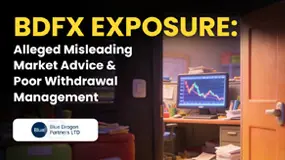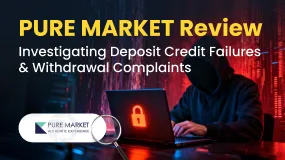Abstract:Choosing the right broker is a critical decision for traders. This article compares FXTM and XM based on basic information, regulatory status, leverage, trading platforms, account types, spreads and commissions, customer service, AI tools, and recent updates. We aim to present an unbiased overview so that you can choose the best broker suited to your needs.

Choosing the right broker is a critical decision for traders. This article compares FXTM and XM based on basic information, regulatory status, leverage, trading platforms, account types, spreads and commissions, customer service, AI tools, and recent updates. We aim to present an unbiased overview so that you can choose the best broker suited to your needs.
1. Basic Information
FXTM:
- Founded: 2011
- Global Presence: FXTM has built a reputation as a global forex and CFD broker with a wide array of tradable instruments, including forex, stocks, indices, commodities, cryptocurrencies, and more.
- Key Focus: FXTM is often noted for its diverse account options and copy trading features, appealing especially to traders seeking advanced trade replication tools.
XM:
- Founded: 2009
- Global Presence: XM is well established and offers over 1,000 trading instruments, spanning forex, commodities, stocks, and indices.
- Key Focus: XM is known for its low minimum deposit (as low as $5 for many accounts) and its educational and market analysis resources, which are particularly attractive to beginners.
2. Regulatory Status
Both brokers are subject to rigorous oversight by multiple authorities, ensuring a high level of investor protection.
- FXTM:
Regulated by top-tier bodies such as the Financial Conduct Authority (FCA) in the UK and the Financial Services Commission (FSC) in Mauritius (among others).
- XM:
Regulated by prominent agencies, including ASIC (Australia), CySEC (Cyprus), DFSA (Dubai), and the IFSC (Belize).
Both brokers adhere to strict regulatory standards; however, the exact regulatory environment and available investor protection schemes can vary by region.


3. Leverage
Leverage levels can greatly influence your trading exposure.
- FXTM:
Depending on the account type and regulatory jurisdiction, FXTM offers leverage up to 1:3000. In regions with regulatory restrictions (such as the EU), maximum leverage is capped—often around 30:1.
- XM:
XM provides leverage up to 1:1000 in many cases. Similar to FXTM, regional limitations may apply (for example, lower leverage levels in the EU).
Traders should choose leverage carefully based on their risk tolerance and regulatory guidelines in their region.
4. Trading Platforms
Both FXTM and XM offer robust and popular trading platforms, primarily built around the MetaTrader family.
- FXTM:
Offers MetaTrader 4 (MT4) and MetaTrader 5 (MT5) along with mobile trading applications. FXTM also features its own copy trading service (FXTM Invest) that appeals to those looking for automated trade replication.
- XM:
Provides access to both MT4 and MT5, along with a proprietary mobile app. XMs platforms are enhanced with comprehensive charting tools and educational add-ons, making them especially beginner-friendly.
Ultimately, both brokers give you the essential tools for effective trading, so the choice may come down to personal platform preference or additional features like copy trading.
5. Account Types
The structure and variety of accounts can help tailor your trading experience.
- FXTM:
Offers several account types—commonly the Advantage, Advantage Plus, and Advantage Stocks accounts. These accounts are designed to cater to different trading strategies, whether youre seeking tighter spreads with commissions or commission-free trading on specific instruments.
- XM:
Provides a range of accounts including Standard, Ultra-Low (with tighter spreads and swap-free options), and Shares accounts. XM is noted for its low entry barrier, with some accounts requiring only a $5 minimum deposit.
Each brokers account types are structured to meet varying trader needs. Your choice might depend on factors like initial capital, desired spreads, and whether you prioritize copy trading or a broader asset offering.
6. Spreads and Commissions
Cost structure is a key factor in trading efficiency.
- FXTM:
FXTMs Advantage account offers spreads from 0.0 pips (with a commission typically around $3.50 per lot), while the Advantage Plus account is commission-free with slightly wider spreads.
- XM:
XM provides competitive, variable spreads—with its Zero account offering spreads as low as 0.0 pips (charged with a commission), and its other account types featuring slightly higher spreads but no commission.
Both brokers aim to offer cost-effective trading, so the best choice will depend on your trading volume and whether you prefer paying a commission for lower spreads or opting for a commission-free model.
7. Customer Service
Efficient and accessible customer support is crucial for a smooth trading experience.
- FXTM:
FXTM offers 24/5 customer support via live chat, email, and telephone. Its support is generally well-regarded, although some users have noted that certain payment methods and regional options may have additional fees.
- XM:
XM provides multilingual customer support around the clock during market hours, with services available via live chat, email, and phone. XMs support is especially praised for its responsiveness and helpfulness.
Both brokers are committed to assisting traders; your regional location and preferred communication method might influence your experience.
8. AI Tools and Recent Updates
The integration of advanced technology can provide a competitive edge.
- FXTM:
FXTM has introduced innovative features such as FXTM Invest for copy trading. While detailed AI tools are not heavily advertised, FXTM does offer advanced market analytics and research resources to support decision-making.
- XM:
XM is known for its extensive educational resources and research tools, including market analysis, technical indicators, and proprietary trading insights. Although XM does not emphasize AI tools specifically, its platform continuously evolves with regular updates and innovative features.
Both brokers leverage technology to enhance the trading experience, so consider which suite of tools aligns with your trading strategy.
9. Conclusion
FXTM and XM both provide robust trading environments with high regulatory standards, competitive costs, and popular trading platforms.
- FXTM may be more appealing if you value a broad range of account options—including copy trading features and potentially higher leverage options (subject to local regulations).
- XM stands out for its low minimum deposit, extensive educational resources, and flexible account types suited to both beginners and experienced traders.
Ultimately, your choice will depend on your trading style, capital availability, regional regulatory requirements, and specific features that matter most to you. For further detailed comparisons, we recommend checking out the WikiFX broker comparison tool.
Trading forex and CFDs involves significant risk, and you should only trade with funds you can afford to lose. Please conduct your own research or consult with a professional advisor before making any trading decisions.












